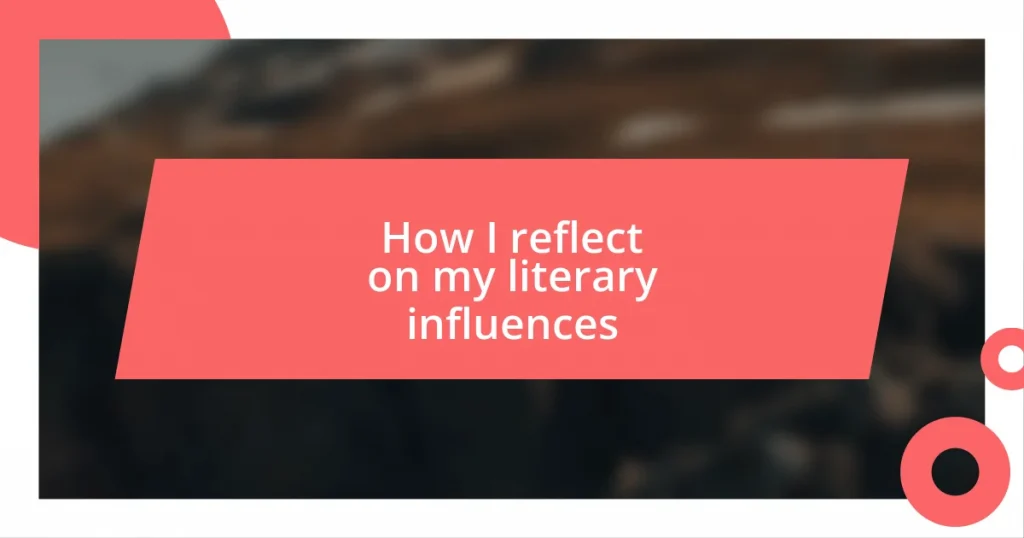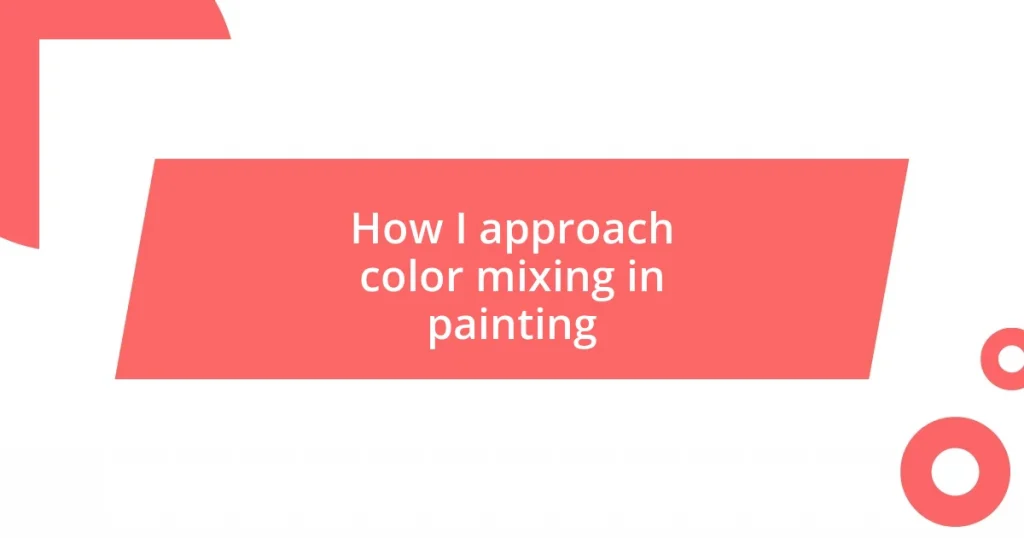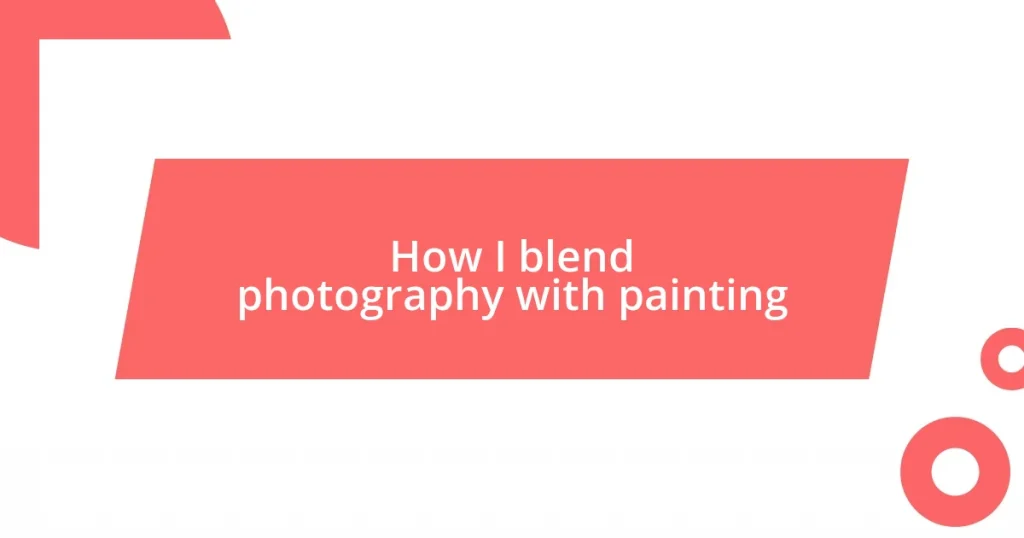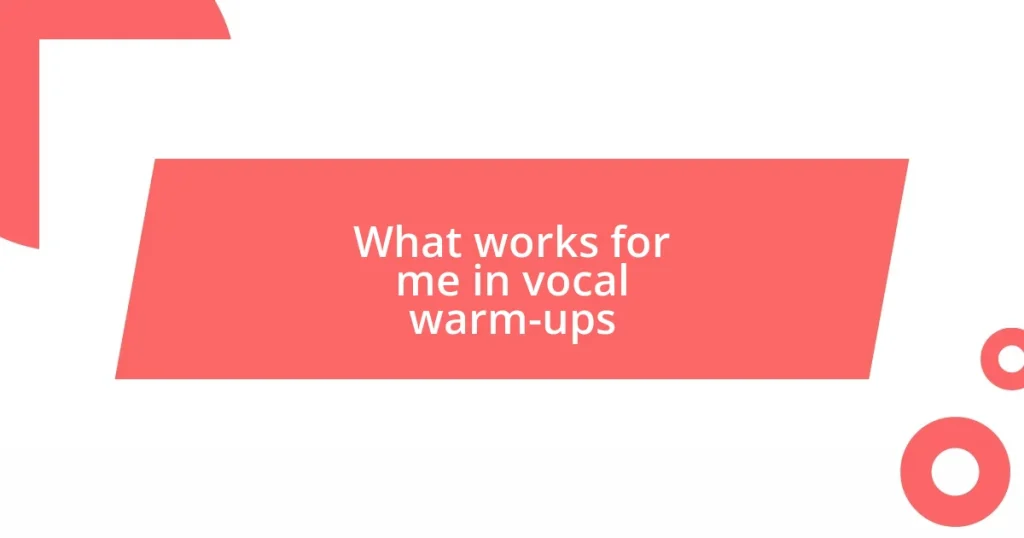Key takeaways:
- Literary influences create a dialogue between readers and texts, shaping narrative styles, themes, and emotional responses in writing.
- Identifying key authors like Murakami, O’Connor, Morrison, and García Márquez highlights the personal impact of their themes, from isolation to identity and magical realism.
- Continuously revisiting influential works fosters deeper understanding and personal growth, allowing writers to integrate these influences into their own unique voices and narratives.
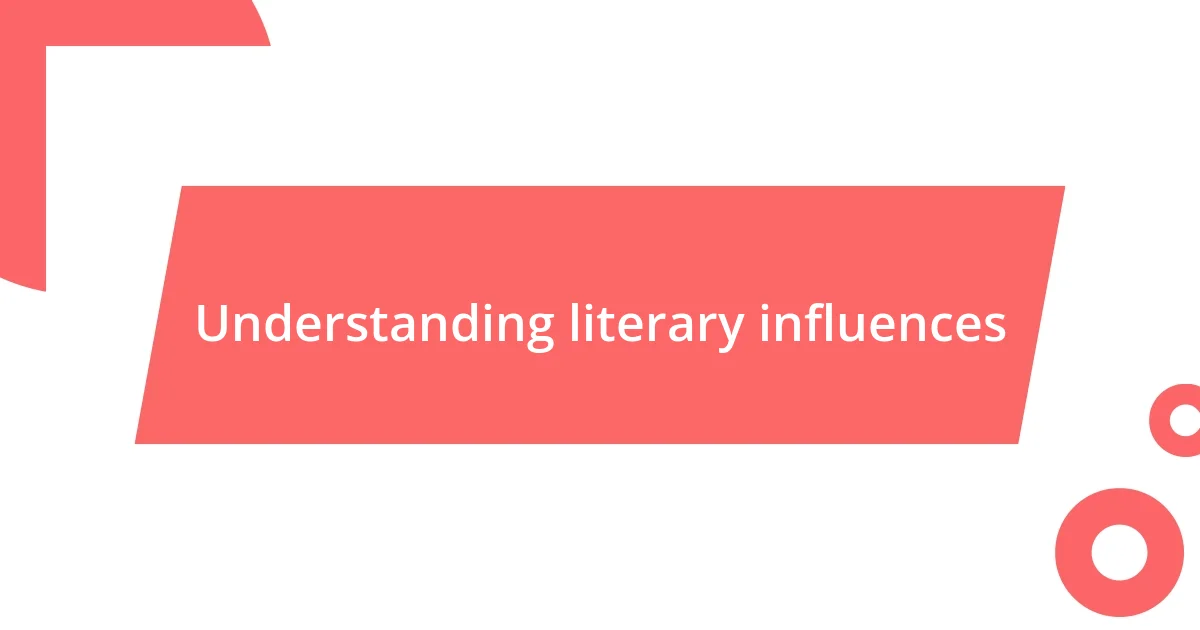
Understanding literary influences
Literary influences shape who we are as writers and thinkers. I remember the first time I picked up a book by Haruki Murakami; his unique blend of the surreal and the mundane resonated with me deeply. Have you ever read a piece of writing that felt like it was pulling strands of your own life into its narrative? That’s the power of influence—it creates a dialogue between the reader and the text.
Understanding literary influences isn’t just about knowing who inspired you; it’s more profound. I often find myself reflecting on how the themes of isolation and interconnectedness in Murakami’s works have seeped into my own storytelling. What have you learned from authors who speak to your heart? These influences guide our narrative styles, thematic choices, and even our emotional responses as we create.
Every time I revisit an old favorite, like F. Scott Fitzgerald, I’m struck by how differently I perceive his writing with each reading. It’s almost like having a conversation with an old friend who reveals new layers every time you meet. Isn’t it fascinating how our own experiences can redefine our understanding of literary works? Embracing these influences helps us grow and evolve as writers, allowing our voices to emerge more authentically.
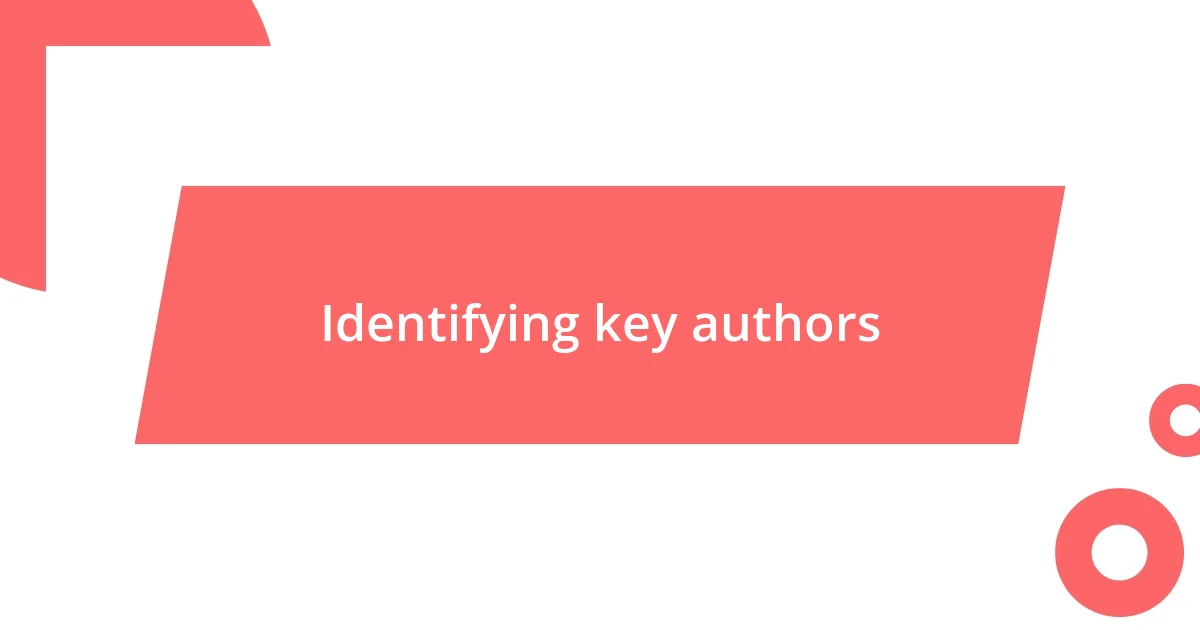
Identifying key authors
Identifying key authors is essential in understanding the threads that weave through my literary journey. For instance, I once stumbled upon a collection of short stories by Flannery O’Connor during a particularly challenging time in my life. Her ability to depict moral complexities resonated with me, and I found myself not just reading her words, but reflecting deeply on my own beliefs. Isn’t it remarkable how certain authors can shine a light on our hidden struggles?
When I consider authors who have left a mark on my writing style, Toni Morrison stands out. Her lyrical prose and exploration of identity have not only shaped my narrative style but also challenged me to confront uncomfortable truths. I remember highlighting passages in “Beloved,” feeling compelled to absorb every emotional nuance. Have you had a moment when a book changed your perspective in such a profound way?
Interestingly, as I delve into the works of Gabriel García Márquez, I feel an irresistible pull towards magical realism. His style encourages me to blend the extraordinary with the ordinary in my own writing. This connection has inspired countless attempts to infuse my narratives with a touch of the surreal. How impactful is it when an author sparks creativity within us? I believe it’s one of the greatest gifts literature can give.
| Author | Main Influence |
|---|---|
| Haruki Murakami | Isolation and interconnectedness |
| Flannery O’Connor | Moral complexity |
| Toni Morrison | Identity and emotional depth |
| Gabriel García Márquez | Magical realism |
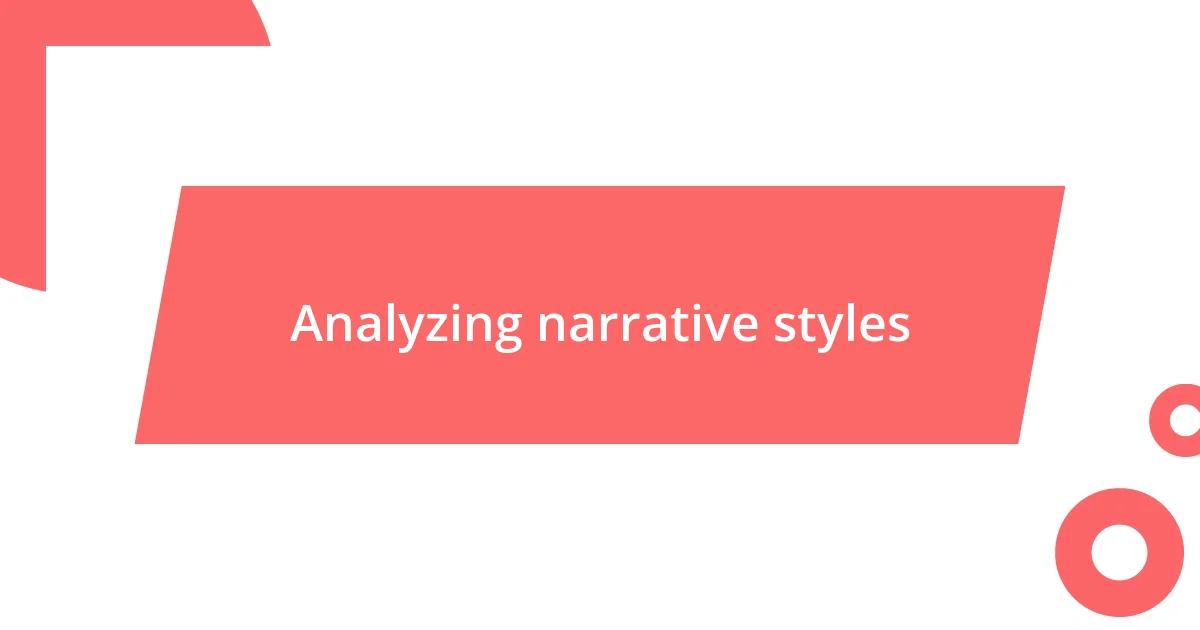
Analyzing narrative styles
Analyzing narrative styles opens up a whole new dimension of understanding for me as a writer. For example, when I first encountered Virginia Woolf’s stream-of-consciousness technique in “Mrs. Dalloway,” it felt like diving into a whirlpool of thoughts and emotions. I couldn’t help but reflect on how this intimate access to characters’ inner lives shaped my own approach to storytelling. Have you ever read something that captures the flow of your thoughts so perfectly it makes you rethink how you convey your own narrative?
- Stream-of-Consciousness: Engages readers by revealing characters’ thoughts in real-time.
- Epistolary Format: Utilizes letters or diary entries to create an authentic connection.
- Non-linear Narratives: Encourages readers to piece together a story, mirroring real-life experiences.
Moreover, I find myself drawn to the rhythm and cadence in the prose of authors like Zadie Smith. Each sentence feels like a musical note, contributing to a larger symphony of voices. I can vividly remember reading her novel “White Teeth” and being captivated by the way she effortlessly shifts perspectives, making me reconsider the reliability of a singular narrative. Isn’t it intriguing how different styles can challenge our perception of truth?
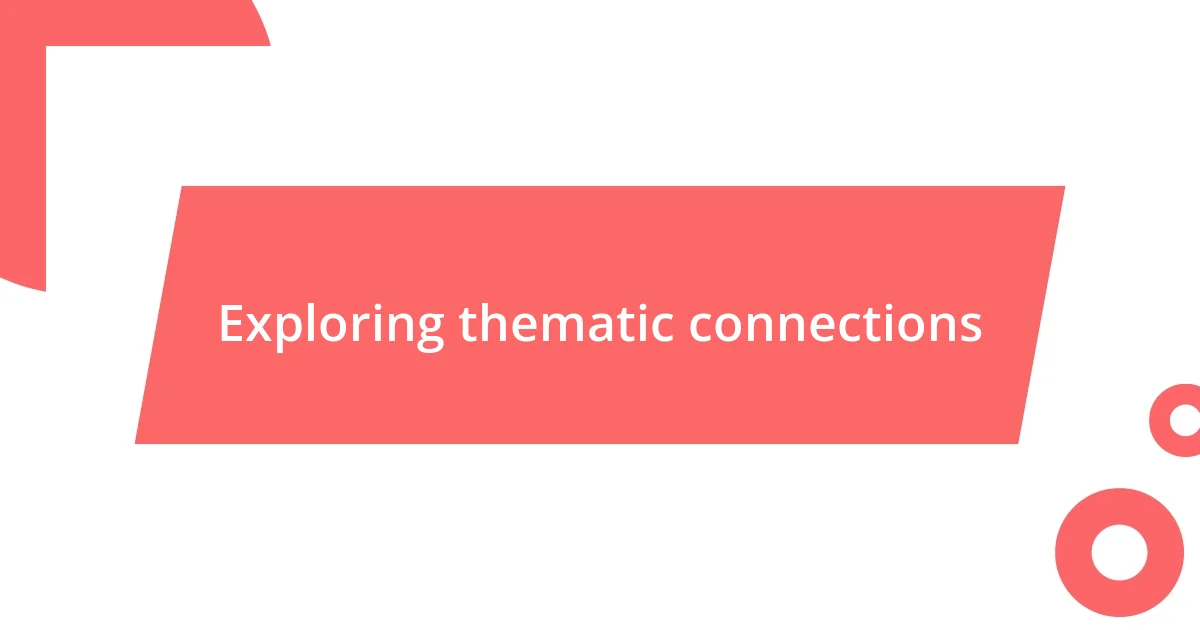
Exploring thematic connections
Exploring thematic connections in literature often leads me down the path of self-discovery. I remember reading Maya Angelou’s “I Know Why the Caged Bird Sings” and feeling a profound connection to her themes of resilience and identity. It was as if she was speaking directly to my own experiences of overcoming obstacles. How powerful is it when a text reflects our struggles and triumphs?
Another author who’s made an indelible impact on my understanding of thematic connections is Haruki Murakami. His exploration of isolation resonates deeply with me, particularly in “Norwegian Wood.” I often found myself reflecting on the interconnectedness of our lives, even amidst solitude. Have you ever pondered how loneliness can paradoxically bring people closer together?
Moreover, the way Chimamanda Ngozi Adichie addresses cultural narratives in her works challenges me to examine my own identity within the broader context of society. I felt a rush of clarity while reading “Americanah,” as her insights on race and belonging enhanced my understanding of my own cultural complexities. Isn’t it enlightening when literature pushes us to reevaluate our place in the world?
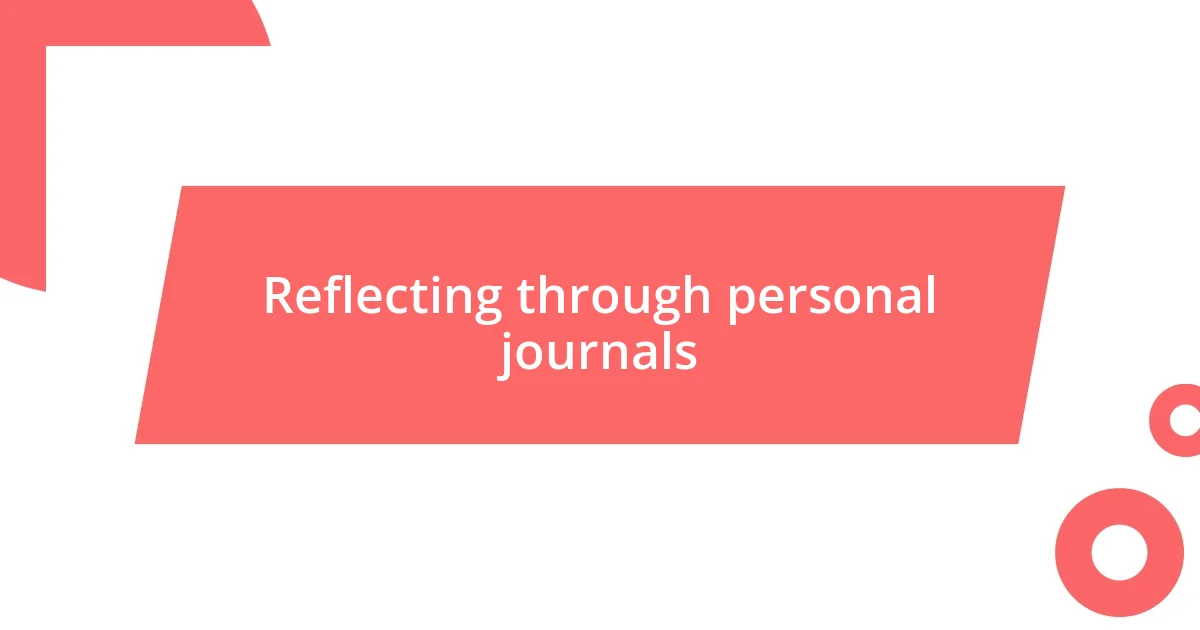
Reflecting through personal journals
Reflecting through personal journals has been a transformative practice for me. Each time I put pen to paper, it feels like peeling back layers of my own psyche. I remember one evening, scribbling away as the rain tapped against my window, when I suddenly recognized the profound impact that Toni Morrison’s themes of heritage and memory have had on my own writing. Have you ever found your emotions spilling out in ways you hadn’t anticipated, just by writing them down?
Maintaining a journal allows me to weave together the influences of beloved authors and my own experiences, creating a unique tapestry of reflection. For instance, after devouring Bell Hooks’ “All About Love,” I found myself drawn to explore my own views on love and relationships. It became clear to me how deeply literature can provoke introspection, prompting me to question my preconceived notions. Isn’t it fascinating how the simple act of journaling can push us to confront our beliefs and feelings head-on?
As I flip through my journal, I often stumble upon snippets of thoughts inspired by the lyrical prose of authors like Ocean Vuong. One entry recounts a moment of vulnerability where I felt like I was unraveling but chose to embrace it instead. I asked myself, how many others might share this struggle? Journaling creates a safe space for such revelations, nurturing a dialogue between my influences and my evolving self. Don’t you find it incredible how words can carve out a path toward understanding our innermost thoughts?
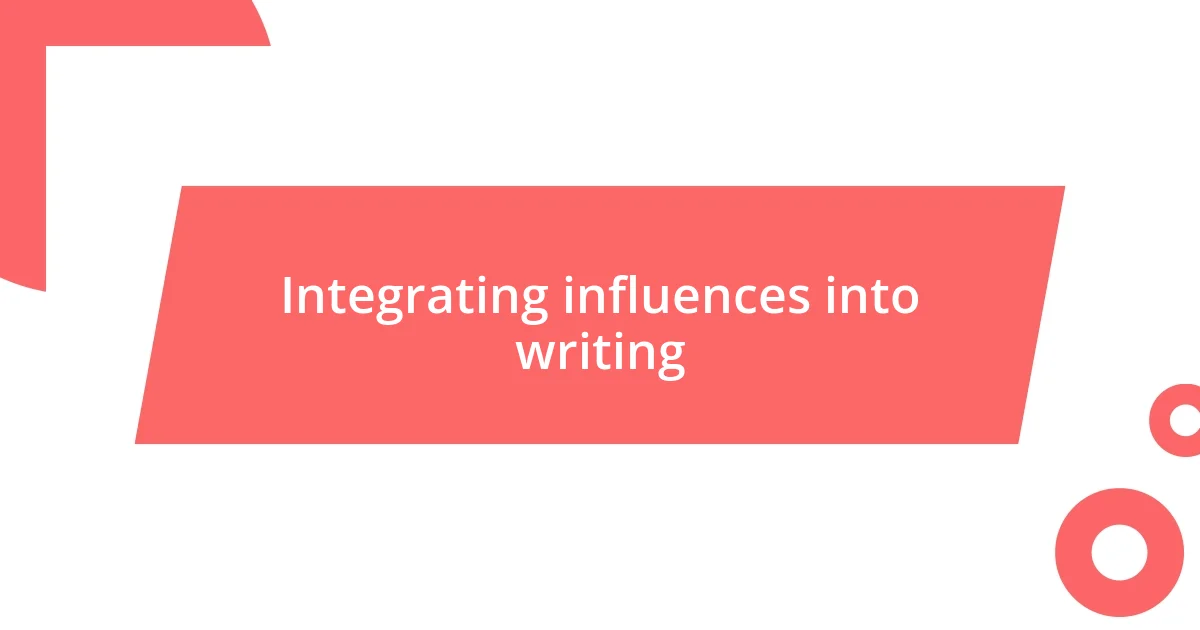
Integrating influences into writing
Integrating influences into my writing is a delicate dance, one that challenges me to harmonize my voice with the brilliant echoes of those I admire. While immersing myself in Virginia Woolf’s narrative style, I started to experiment with stream-of-consciousness techniques in my own work. I recall a moment of sheer excitement when I penned a piece that flowed freely, capturing the chaos of my thoughts just as she did. Have you ever felt that delightful rush when you try something new and it just clicks?
Often, I find myself taking direct cues from the literary devices used by my influences. After binge-reading Neil Gaiman, I felt inspired to play with magical realism in my writing. One evening, I crafted a short story about a mundane coffee shop that transforms into a portal to another world, taking readers along with me on this whimsical journey. Isn’t it thrilling when you convert inspiration into something entirely your own?
Moreover, integrating my influences requires me to step back and analyze what speaks to me on a deeper level. I vividly remember grappling with themes of love and heartbreak after finishing “The Bell Jar” by Sylvia Plath. It compelled me to intertwine similar raw emotions in my poetry, revealing a layer of vulnerability I hadn’t explored before. As I wrote, I asked myself, how can I channel my truth while honoring the voices that paved the way for me? This ongoing quest not only enriches my writing but also deepens my connection to the literary tradition that continues to shape me.
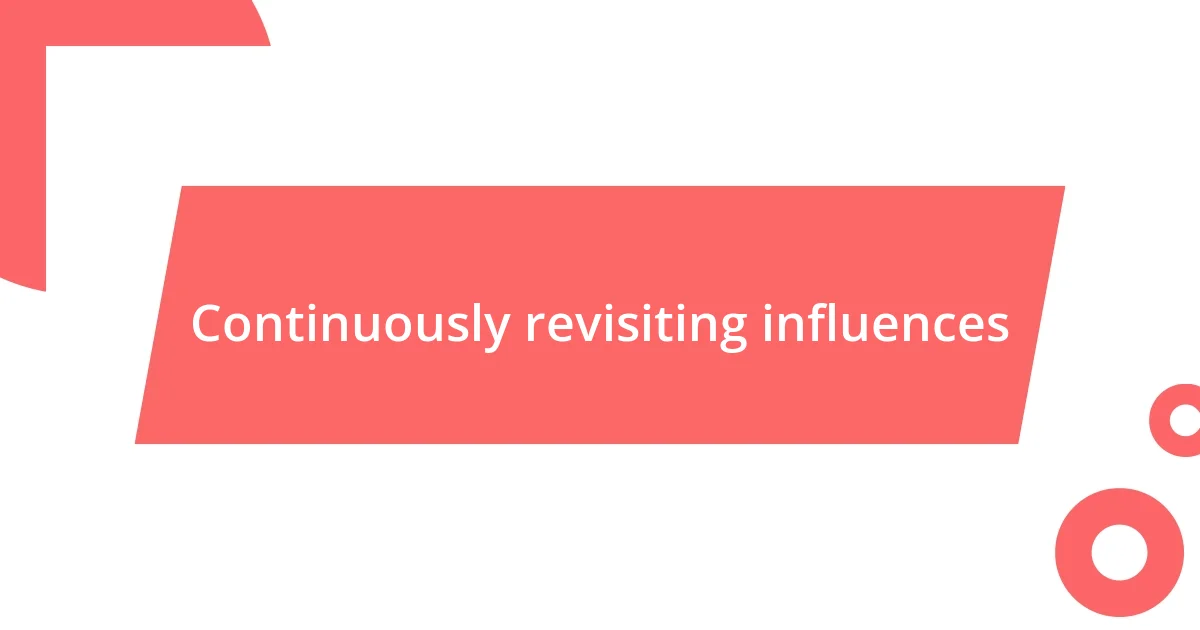
Continuously revisiting influences
Revisiting my literary influences has become more than a casual habit; it’s a ritual that continuously enriches my creative process. I find myself returning to Emily Dickinson’s poems whenever I feel a creative block, her succinct language unlocking pathways I didn’t know existed in my mind. Each time I read lines like “Hope is the thing with feathers,” I’m reminded of the resilience and beauty embedded in simplicity. Have you ever experienced a rush of inspiration just by revisiting a familiar piece of writing?
In my personal library, dog-eared pages and highlighted passages bear witness to my ongoing journey with influential authors. I remember a specific book club meeting where I re-read Gabriel Garcia Marquez’s “One Hundred Years of Solitude” and was struck by its rich layers once more. This time, the themes of solitude felt particularly resonant, echoing my own feelings during a time of isolation. Has a book ever shifted its meaning for you at different points in your life?
It’s fascinating how the process of revisiting influences deepens my understanding of both the texts and myself. After reading Haruki Murakami’s surreal narratives over and over, I now appreciate the way he blends the ordinary with the extraordinary. His ability to weave complex emotional landscapes mirrors my own struggles and aspirations, making each re-reading feel like a different conversation. Engaging with these texts again pulls me into ongoing dialogues about identity and purpose; it’s where I find clarity and new insights. Isn’t it amazing how literature can constantly reshape our perspectives?










